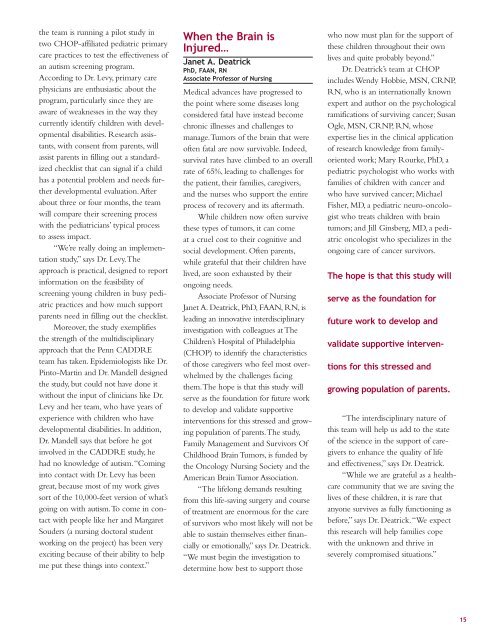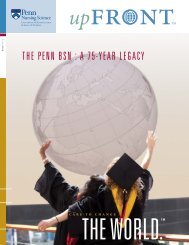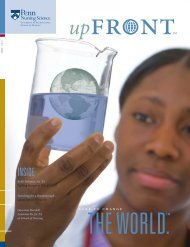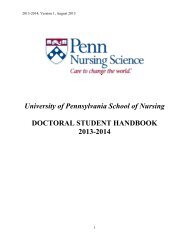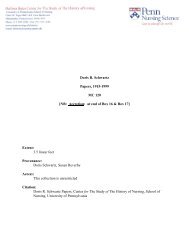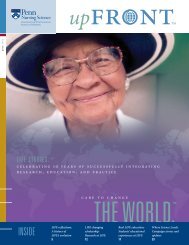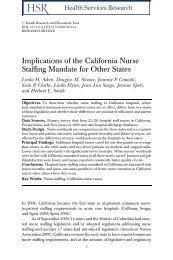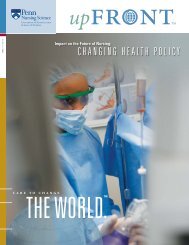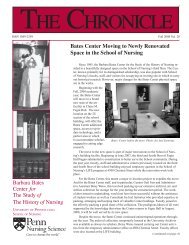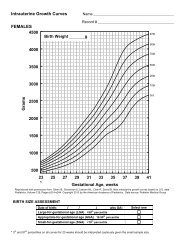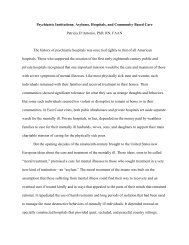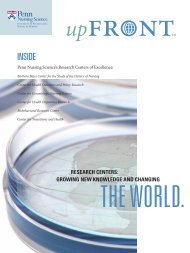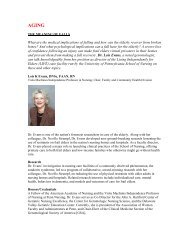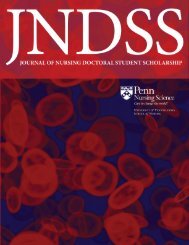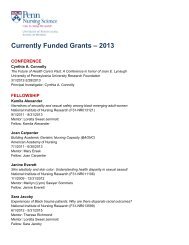Penn Nursing 090805_final_4c - University of Pennsylvania School ...
Penn Nursing 090805_final_4c - University of Pennsylvania School ...
Penn Nursing 090805_final_4c - University of Pennsylvania School ...
Create successful ePaper yourself
Turn your PDF publications into a flip-book with our unique Google optimized e-Paper software.
the team is running a pilot study in<br />
two CHOP-affiliated pediatric primary<br />
care practices to test the effectiveness <strong>of</strong><br />
an autism screening program.<br />
According to Dr. Levy, primary care<br />
physicians are enthusiastic about the<br />
program, particularly since they are<br />
aware <strong>of</strong> weaknesses in the way they<br />
currently identify children with developmental<br />
disabilities. Research assistants,<br />
with consent from parents, will<br />
assist parents in filling out a standardized<br />
checklist that can signal if a child<br />
has a potential problem and needs further<br />
developmental evaluation.After<br />
about three or four months, the team<br />
will compare their screening process<br />
with the pediatricians’ typical process<br />
to assess impact.<br />
“We’re really doing an implementation<br />
study,” says Dr. Levy.The<br />
approach is practical, designed to report<br />
information on the feasibility <strong>of</strong><br />
screening young children in busy pediatric<br />
practices and how much support<br />
parents need in filling out the checklist.<br />
Moreover, the study exemplifies<br />
the strength <strong>of</strong> the multidisciplinary<br />
approach that the <strong>Penn</strong> CADDRE<br />
team has taken. Epidemiologists like Dr.<br />
Pinto-Martin and Dr. Mandell designed<br />
the study, but could not have done it<br />
without the input <strong>of</strong> clinicians like Dr.<br />
Levy and her team, who have years <strong>of</strong><br />
experience with children who have<br />
developmental disabilities. In addition,<br />
Dr. Mandell says that before he got<br />
involved in the CADDRE study, he<br />
had no knowledge <strong>of</strong> autism.“Coming<br />
into contact with Dr. Levy has been<br />
great, because most <strong>of</strong> my work gives<br />
sort <strong>of</strong> the 10,000-feet version <strong>of</strong> what’s<br />
going on with autism.To come in contact<br />
with people like her and Margaret<br />
Souders (a nursing doctoral student<br />
working on the project) has been very<br />
exciting because <strong>of</strong> their ability to help<br />
me put these things into context.”<br />
When the Brain is<br />
Injured…<br />
Janet A. Deatrick<br />
PhD, FAAN, RN<br />
Associate Pr<strong>of</strong>essor <strong>of</strong> <strong>Nursing</strong><br />
Medical advances have progressed to<br />
the point where some diseases long<br />
considered fatal have instead become<br />
chronic illnesses and challenges to<br />
manage.Tumors <strong>of</strong> the brain that were<br />
<strong>of</strong>ten fatal are now survivable. Indeed,<br />
survival rates have climbed to an overall<br />
rate <strong>of</strong> 65%, leading to challenges for<br />
the patient, their families, caregivers,<br />
and the nurses who support the entire<br />
process <strong>of</strong> recovery and its aftermath.<br />
While children now <strong>of</strong>ten survive<br />
these types <strong>of</strong> tumors, it can come<br />
at a cruel cost to their cognitive and<br />
social development. Often parents,<br />
while grateful that their children have<br />
lived, are soon exhausted by their<br />
ongoing needs.<br />
Associate Pr<strong>of</strong>essor <strong>of</strong> <strong>Nursing</strong><br />
Janet A. Deatrick, PhD, FAAN, RN, is<br />
leading an innovative interdisciplinary<br />
investigation with colleagues at The<br />
Children’s Hospital <strong>of</strong> Philadelphia<br />
(CHOP) to identify the characteristics<br />
<strong>of</strong> those caregivers who feel most overwhelmed<br />
by the challenges facing<br />
them.The hope is that this study will<br />
serve as the foundation for future work<br />
to develop and validate supportive<br />
interventions for this stressed and growing<br />
population <strong>of</strong> parents.The study,<br />
Family Management and Survivors Of<br />
Childhood Brain Tumors, is funded by<br />
the Oncology <strong>Nursing</strong> Society and the<br />
American Brain Tumor Association.<br />
“The lifelong demands resulting<br />
from this life-saving surgery and course<br />
<strong>of</strong> treatment are enormous for the care<br />
<strong>of</strong> survivors who most likely will not be<br />
able to sustain themselves either financially<br />
or emotionally,” says Dr. Deatrick.<br />
“We must begin the investigation to<br />
determine how best to support those<br />
who now must plan for the support <strong>of</strong><br />
these children throughout their own<br />
lives and quite probably beyond.”<br />
Dr. Deatrick’s team at CHOP<br />
includes Wendy Hobbie, MSN, CRNP,<br />
RN, who is an internationally known<br />
expert and author on the psychological<br />
ramifications <strong>of</strong> surviving cancer; Susan<br />
Ogle, MSN, CRNP, RN, whose<br />
expertise lies in the clinical application<br />
<strong>of</strong> research knowledge from familyoriented<br />
work; Mary Rourke, PhD, a<br />
pediatric psychologist who works with<br />
families <strong>of</strong> children with cancer and<br />
who have survived cancer; Michael<br />
Fisher, MD, a pediatric neuro-oncologist<br />
who treats children with brain<br />
tumors; and Jill Ginsberg, MD, a pediatric<br />
oncologist who specializes in the<br />
ongoing care <strong>of</strong> cancer survivors.<br />
The hope is that this study will<br />
serve as the foundation for<br />
future work to develop and<br />
validate supportive interventions<br />
for this stressed and<br />
growing population <strong>of</strong> parents.<br />
“The interdisciplinary nature <strong>of</strong><br />
this team will help us add to the state<br />
<strong>of</strong> the science in the support <strong>of</strong> caregivers<br />
to enhance the quality <strong>of</strong> life<br />
and effectiveness,” says Dr. Deatrick.<br />
“While we are grateful as a healthcare<br />
community that we are saving the<br />
lives <strong>of</strong> these children, it is rare that<br />
anyone survives as fully functioning as<br />
before,” says Dr. Deatrick.“We expect<br />
this research will help families cope<br />
with the unknown and thrive in<br />
severely compromised situations.”<br />
15


